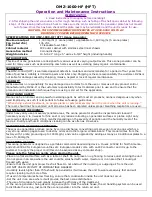
19
en
1. Bear in mind ambient conditions (ambient temperature, direct sunlight, rain water, etc.) when proceeding with the wiring and connections.
2. The wire size is the minimum value for metal conduit wiring. The power cord size should be 1 rank thicker consideration of voltage drops.
Make sure the power-supply voltage does not drop more than 10%.
3. Specific wiring requirements should adhere to the wiring regulations of the region.
4. Power supply cords of parts of appliances for outdoor use shall not be lighter than polychloroprene sheathed flexible cord (design 60245 IEC57). For example,
use wiring such as YZW.
5. Install an earth longer than other cables.
Sample chart
6. Electrical work
Warning:
• Please turn off the main power supply when servicing. And do not touch the B1, B2 terminals when the power is energized. If isolator should be used
between outdoor unit and branch box/indoor unit and branch box, please use 2-pole type.
(Please refer to figure below.)
Caution:
After using the isolator, be sure to turn off and on the main power supply to reset the system. Otherwise, the outdoor unit may not be able to detect the branch
box(es) or indoor units.
Be sure to connect the outdoor-branch box/indoor-branch box connecting cables directly to the units (no intermediate connections).
Intermediate connections can lead to communication errors if water enters the cables and causes insufficient insulation to ground or a poor electrical contact at the
intermediate connection point.
B1
B2
L
N
Outdoor unit
2 poles isolator (Switch)
Branch box
Warning:
• Be sure to use specified wires to connect so that no external force is imparted to terminal connections. If connections are not fixed firmly, it may cause heat-
ing or fire.
• Be sure to use the appropriate type of overcurrent protection switch. Note that generated overcurrent may include some amount of direct current.
• Be sure to attach the terminal block covers/panel of the outdoor unit securely.
If it is not attached correctly, if could result in a fire or an electric shock due to dust, water. etc.
Caution:
• Be careful not to make mis-wiring.
• Firmly tighten the terminal screws to prevent them from loosening.
• After tightening, pull the wires lightly to confirm that they not move.
• If the connecting wire is incorrectly connected to the terminal block, the unit does not operate normally.
• Some installation site may require attachment of an earth leakage breaker. If no earth leakage breaker is installed, it may
cause an electric shock.
• Do not use anything other than breaker and fuse with correct capacity. Using fuse and wire or copper wire with too large
capacity may cause a malfunction of unit or fire.
IMPORTANT
Make sure that the current leakage breaker is one compatible with higher harmonics.
Always use a current leakage breaker that is compatible with higher harmonics as this unit is equipped with an inverter.
The use of an inadequate breaker can cause the incorrect operation of inverter.
Never splice the power cable or the indoor-outdoor-branch box connection cable, otherwise it may result in a smoke, a fire or communication failure.
<Example of “F2” calculation>
Condition PEFY-VMS × 4 + PEFY-P·VMA-E × 1, C = 8 (refer to right sample chart)
F2 = 19.8 × 4/8 + 38 × 1/8
= 14.65
→ 16 A breaker (Tripping current = 8 × 16 A at 0.01s)
*3 Current sensitivity is calculated using the following formula.
G1 = V2 × (Quantity of Type1) + V2 × (Quantity of Type2) + V2 × (Quantity of Type3) + ··· + V2 × (Quantity of Type16)
+ V3 × (Wire length[km])
G1
Current sensitivity
30 or less
30 mA 0.1 sec. or less
100 or less
100 mA 0.1 sec. or less
Wire thickness
V3
1.5 mm
2
48
2.5 mm
2
56
4.0 mm
2
66
6000
600
60
10
1
1
2
3 4
6 8
C
10
20
Rated Tripping current (x)
SAMPLE
0.1
0.01
Tripping
Time [s]
Connection details
Lead wire
Terminal
block
Loosen terminal screw.
BH79D826H05.indb 19
2020/04/27 9:37:01
021






































